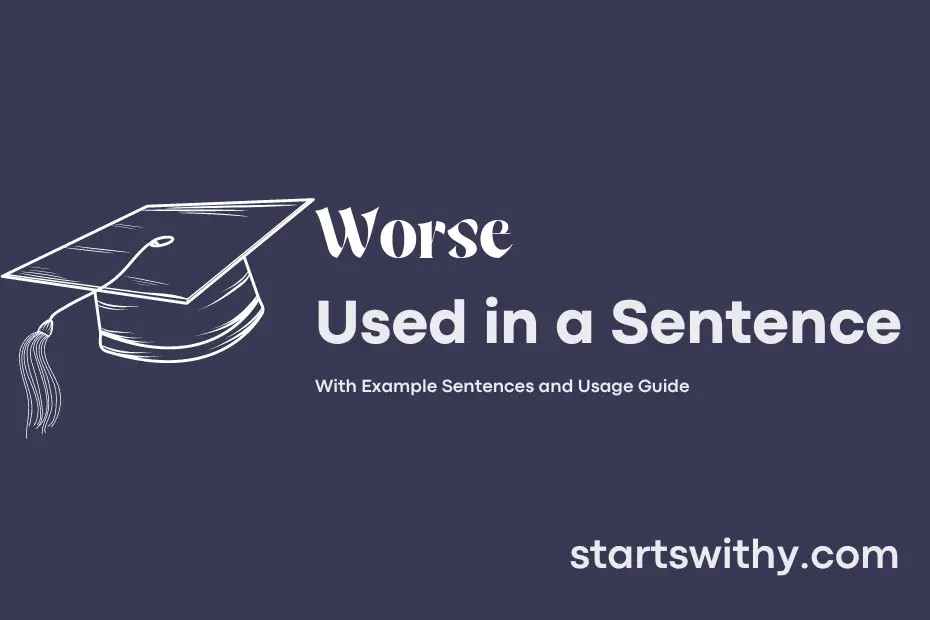Have you ever struggled to distinguish between “worse” and “worst” in English? Let’s clarify this common language dilemma.
“Worse” is a comparative adjective used to indicate a lower degree of quality, while “worst” is the superlative form, signifying the least favorable condition. Understanding the difference between these two words will help you express varying levels of negativity accurately.
7 Examples Of Worse Used In a Sentence For Kids
- The weather today is worse than yesterday.
- The taste of this food is worse than I expected.
- The traffic is worse during rush hour.
- I feel worse when I skip breakfast.
- It’s worse to lose a toy than to share it.
- My cold is getting worse instead of better.
- Falling off a bike is worse than a paper cut.
14 Sentences with Worse Examples
- Worse than forgetting your umbrella on a rainy day is realizing you also left your textbooks at home.
- Submitting an assignment with incorrect information is even worse when it’s a group project and everyone relies on your part.
- It’s worse to fall asleep during a lecture when you wake up and realize you missed important information covered by the professor.
- Having a slow internet connection can make online classes even worse by causing constant disruptions and delays.
- Worse than missing a deadline is realizing you missed the exam date altogether.
- It’s worse to run out of printer ink when you are in a rush to submit a printed assignment at the last minute.
- Opening your bag to find a broken laptop is one of the worse things that can happen during exam week.
- Worse than running out of stationary supplies during an exam is not being able to borrow any from friends because they are all in the same situation.
- Forgetting your student ID at home on the day of an important exam is a situation that couldn’t get any worse.
- It’s worse to have a power outage during an online exam than during a regular one because there’s no way to pause the clock.
- Realizing you forgot your lunchbox at home can be worse when you remember there’s a canteen strike on campus that day.
- Breaking your favorite pen during a lengthy note-taking session can make a boring lecture even worse.
- Worse than losing your headphones is realizing it happened the night before an online seminar that you were supposed to attend.
- Accidentally deleting your entire semester’s notes from your laptop is definitely one of the worse nightmares for a college student in India.
How To Use Worse in Sentences?
To use the word worse in a sentence, it is important to understand its meaning and proper usage in context.
Worse is used to compare two things and indicates that one is of a lower quality, standard, or condition than the other. For example, “Her performance was worse than his during the competition.”
When using worse in a sentence, it is typically followed by the word “than” to establish the comparison between the two items or situations. For instance, “His health condition is getting worse than before.”
Additionally, worse can be used to express a negative change or decline from a previous state. For example, “After the storm, the weather got worse as the rain continued to fall heavily.”
It is essential to pay attention to the context in which you are using worse to ensure that the comparison or decline is clearly understood. Make sure to compare similar things or situations when using worse for a valid comparison.
In summary, when incorporating worse into a sentence, remember to compare two entities or describe a decline in quality or condition from a previous state. By following these guidelines, you can effectively use worse to convey the intended meaning in your writing or conversation.
Conclusion
In conclusion, the examples of sentences with “worse” demonstrate comparisons between things or situations that are not as good as others. These sentences highlight the idea of something being of lower quality, less favorable, or more negative in comparison to something else. By using “worse” in sentences, we can effectively show contrasts, evaluate choices, and express dissatisfaction with certain outcomes or conditions.
Through the use of sentences with “worse,” we can clearly convey the differences in quality, performance, or conditions. Whether discussing personal experiences, product reviews, or societal issues, the word “worse” provides a simple and direct way to articulate shortcomings and limitations. By incorporating this term thoughtfully in writing and speech, we can enhance the clarity and impact of our communication.



